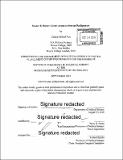| dc.contributor.advisor | Barry R. Posen. | en_US |
| dc.contributor.author | Nutt, Cullen Gifford. | en_US |
| dc.contributor.other | Massachusetts Institute of Technology. Department of Political Science. | en_US |
| dc.date.accessioned | 2020-03-24T15:37:25Z | |
| dc.date.available | 2020-03-24T15:37:25Z | |
| dc.date.copyright | 2019 | en_US |
| dc.date.issued | 2019 | en_US |
| dc.identifier.uri | https://hdl.handle.net/1721.1/124273 | |
| dc.description | Thesis: Ph. D., Massachusetts Institute of Technology, Department of Political Science, 2019 | en_US |
| dc.description | Cataloged from PDF version of thesis. | en_US |
| dc.description | Includes bibliographical references (pages 301-308). | en_US |
| dc.description.abstract | Why do states intervene covertly in some places and not others? This is a pressing question for theorists and policymakers because covert action is widespread, costly, and consequential. I argue that states wield it-whether by supporting political parties, arming dissidents, sponsoring coups, or assassinating leaders-when they fear that a target is at risk of shifting its alignment toward the state that the intervener considers most threatening. Covert action is a rational response to the threat of realignment. Interveners correctly recognize a window of opportunity: Owing to its circumscribed nature, covert action is more likely to be effective before realignment than after. This means that acting sooner is better. I test this argument in case studies of covert action decision-making by the United States in Indonesia, Iraq, and Portugal. I then conduct a test of the theory's power in a medium-N analysis of 97 cases of serious consideration of such action by the United States during the Cold War. Interveners, I suggest, do not employ covert action as a result of bias on the part of intelligence agencies. Nor do they use it to add to their power. Rather, states act covertly when they fear international realignment. | en_US |
| dc.description.statementofresponsibility | by Cullen Gifford Nutt. | en_US |
| dc.format.extent | 308 pages | en_US |
| dc.language.iso | eng | en_US |
| dc.publisher | Massachusetts Institute of Technology | en_US |
| dc.rights | MIT theses are protected by copyright. They may be viewed, downloaded, or printed from this source but further reproduction or distribution in any format is prohibited without written permission. | en_US |
| dc.rights.uri | http://dspace.mit.edu/handle/1721.1/7582 | en_US |
| dc.subject | Political Science. | en_US |
| dc.title | Sooner is better : covert action to prevent realignment | en_US |
| dc.title.alternative | Covert action to prevent realignment | en_US |
| dc.type | Thesis | en_US |
| dc.description.degree | Ph. D. | en_US |
| dc.contributor.department | Massachusetts Institute of Technology. Department of Political Science | en_US |
| dc.identifier.oclc | 1144176185 | en_US |
| dc.description.collection | Ph.D. Massachusetts Institute of Technology, Department of Political Science | en_US |
| dspace.imported | 2020-03-24T15:37:24Z | en_US |
| mit.thesis.degree | Doctoral | en_US |
| mit.thesis.department | PoliSci | en_US |
